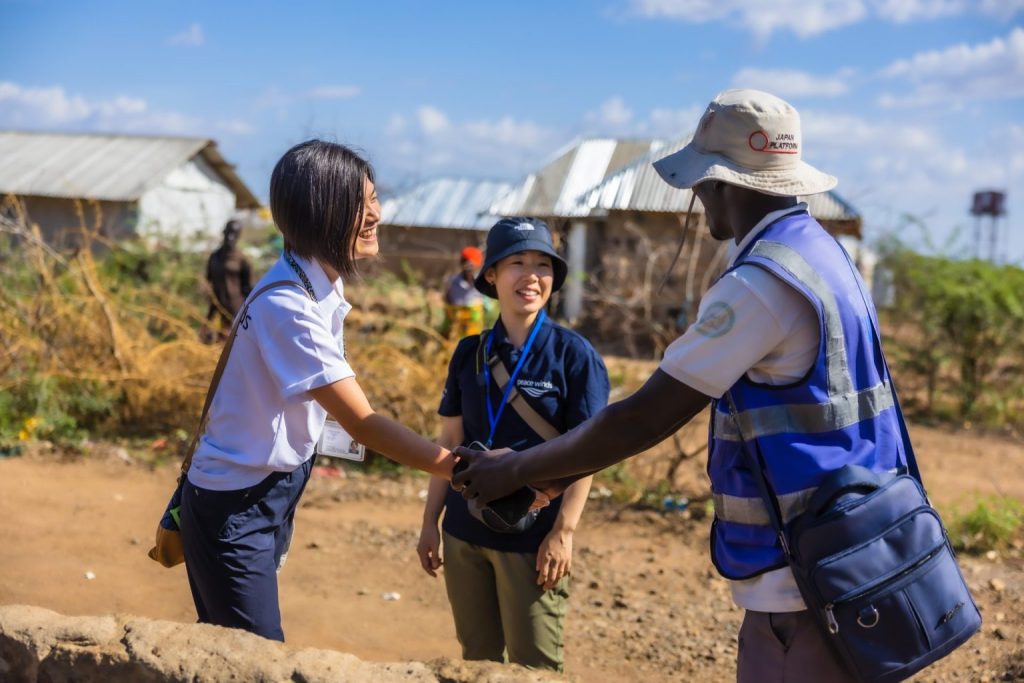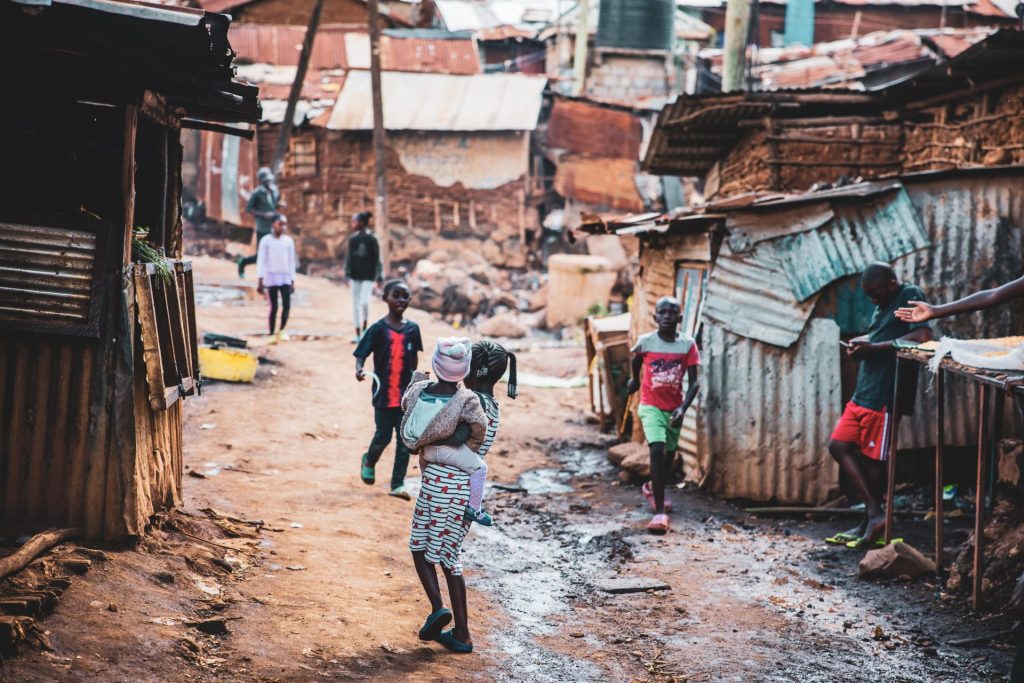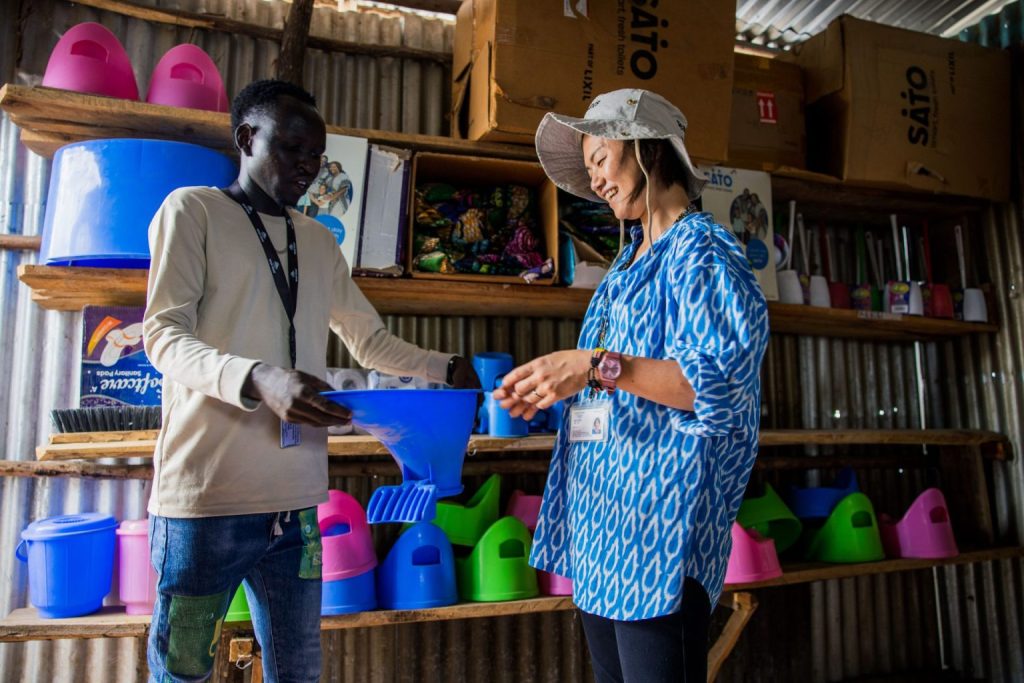Laying the groundwork for self-reliance in Kenya’s refugee settlements

Meet Akiko Chiba, Peace Winds Country Representative in Kenya. Refugee populations are surging, camps are overcrowded, and funding for humanitarian aid is getting cut around the globe. Meanwhile, Ms. Chiba and her team are finding innovative ways to empower refugees’ sense of self-reliance and ensure they can access the water and sanitation services they need in the long-term. We spoke with her about her experience in the field amid a changing landscape.
What first sparked your interest in humanitarian work?
Chiba: When I was in elementary school, I saw Tetsuko Kuroyanagi on TV, an actress who was a UNICEF Goodwill Ambassador at the time. She was talking about the famine in Ethiopia, and I remember wondering why there were people starving even though so much rice was going to waste in Japan. I felt like I wanted to do something.
However, as I was graduating college, I started to question if I was in a position to help others, so I chose to work for a private company. But then I realized that wasn’t the right choice for me, so I got qualified as a Japanese language teacher, applied to the Japan Overseas Cooperation Volunteers, and was dispatched to Egypt at the age of 24. I really enjoyed it.
Later, I got a job as a field coordinator with JICA (the Japanese International Cooperation Agency) in Kenya. At that time, the HIV infection rate in the Lake Victoria area was over 20%, and the situation was dire. I learned a lot because it was closely related to the sexuality and reproductive health issues that I was researching in graduate school. I also learned how to coordinate between various organizations and people, such as Kenyan government agencies, JICA, and local people, and how to carry out prevention and awareness activities.
Ms. Chiba then took a six-year hiatus living in Brazil with her husband and young daughter before returning to Kenya in 2017.
That was when I met a Peace Winds manager who was in Kenya on a business trip, which led me to my current position.

We’ve been hearing that around 1,000,000 refugees and asylum seekers have fled into Kenya from neighboring Somalia, South Sudan, and other countries. There are so many needs in the refugee camps, but Peace Winds is mainly supporting water and sanitation right now. I imagine there are a lot of challenges, but what do you find rewarding or joyful about the work?
Chiba: Refugee camps face a host of problems, including conflicts among different groups of refugees that they brought from their home countries. Now, in particular, countries around the world are also cutting their budgets for humanitarian aid, forcing organizations like ours to scale back programs. Some refugee camps in Kenya have been there for over 30 years, and when they’ve been there for that long, people can become passive because they’re so used to relying on aid, creating some truly difficult problems.
But if you get the community involved and keep working, you’ll see results, even if it takes time. Personally, I find that the trial and error that goes into it is fascinating.

For example, one of the issues we’ve been working on is sanitation. Conventional humanitarian aid is to build toilets according to standards like “one toilet for every five refugee households.” But if no one takes responsibility for maintaining them, then they get so dirty so quickly that no one wants to use them, and people revert to open defecation. If human waste is left unattended like that, it can lead to cholera epidemics during the rainy season, which can be life threatening. That system wasn’t going to cut it, so we found we had to change the way we do things.
So instead of just building toilets, we worked with community hygiene promoters, who are refugees and camp residents themselves, to lead other residents in discussions about the sanitation situation in the camp and what they felt the problems were. The workers support refugee families in building their toilets by themselves and taking responsibility for maintaining them so that people would continue to use them.

People were skeptical at first. They’d say things like “what’s the point of supporting us if you’re not going to build toilets?” But once the toilets were kept clean and open defecation was eliminated, the bad smells in the camp disappeared, and people even said that their food tasted better when they ate outside.
Once they see how the new approach works, their behavior changes. We were persistent with awareness-raising efforts, and the government declared the camp “open defecation free” in 2020, which we celebrated–although we can face setbacks when new groups of refugees come in.
It’s encouraging to see those changes.
Chiba: Definitely. Another thing I like about my work is when I go to meetings at government offices, UN agencies, and other places to discuss directly with others and lay the groundwork for these programs. When all of that culminates in a program and we get to see the results, it makes me really happy, like “we did it!”
Sometimes I think that’s why I do this job. I love it. Once we all understand what we’re working toward, everyone is really dedicated. Staff who work on essential services like water supply are especially aware of how important it is, and they’ll work at night or on weekends if there’s an emergency. It’s such a pleasure to work with them.
What’s something you keep in mind while you’re working?
Chiba: I believe that dignity is such an important part of being alive. My goal is to carry out programs that help people maintain that feeling so they can live with a sense of purpose.
